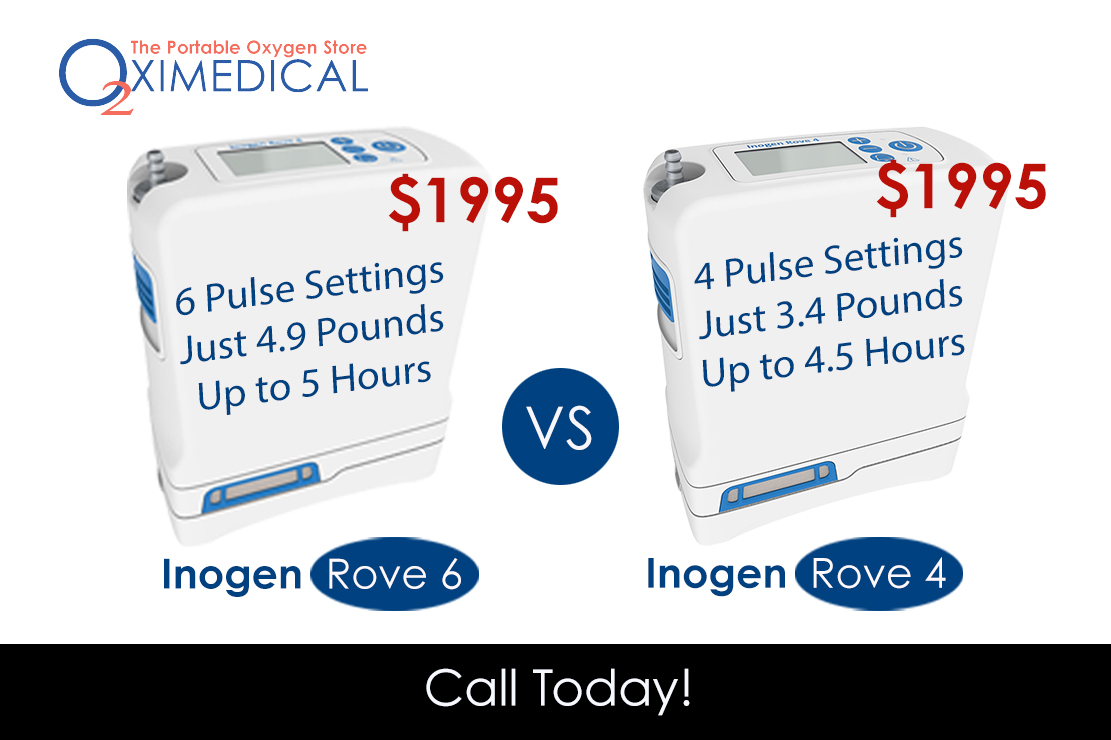
When my doctor first told me I needed long-term oxygen therapy to manage my chronic bronchitis, I have to admit, I was scared.
Immediately I saw visions of myself strapped to an over-sized metal cylinder taking pull-after-pull from an oxygen mask, confined to a chair in my living room. My mind raced: Would I have to lug an unwieldy tank around with me everywhere I went? Aren’t those things extremely flammable? How about traveling? Would this affect my trips to Seattle to see my four grandchildren? Our annual ski vacation to the Rockies?
Would my life, as I knew it, ever be the same?
Does this sound familiar? Did you have the same conversation with yourself when you learned you needed oxygen therapy?
Here a few things you need to know to ease your fears:
Oxygen therapy had advanced considerably in the last eight years. Portable oxygen concentrators (POCs) give patients more options, freedom, and flexibility than ever before.
Gone are the days when oxygen patients have to kiss their Golden Years goodbye. Sure, having lung disease was a serious matter, one you will have to manage for the rest of your years, but it doesn’t mean you can’t enjoy most of the lifestyle you are accustomed to.
Oxygen devices came in many varieties, and knowing which one fits your lifestyle best is vital.
Oxygen can be delivered in gaseous or liquid form. Gaseous oxygen is often provided in cylinders, which are delivered by a homecare provider, or they may be filled from a trans-fill system that is kept in the home. For the home, the most common gaseous oxygen delivery device is the oxygen concentrator, which draws in air and separates the oxygen from other gases. Stationary (or home) concentrators are powerful, but often large, and generally don’t leave the house.
For oxygen on-the-go, portable concentrators are quickly rising to the top as the best source of oxygen. Portable oxygen concentrators are small and easy to carry or wheel on a cart. They work on electrical power in the home, use your car’s battery power when plugged into the automobile outlet, and even work on battery power for maximum portability. That means you can make those travel plans to Seattle to see your grandchildren, or even take that trip to the Rockies.
Keep in mind, you have the right to choose your oxygen equipment provider and not all providers offer the entire range of oxygen systems. So talk to your doctor and do your research.
Being dependent on supplemental oxygen isn’t easy, but it can be manageable.
It’s up to you (and me) to help make it that way.






Have you rated the various POCs on maintenance, reliability, cost to maintain, and purchase cost? If so, please point me towards the info…
I have not yet done such a rating; however, it is a worthy topic and one I will probably address in the future.
I would prefer your help by phone I rarely use my gmail account cause I don’t remember my password, could you please call me at:405 637-7699? I would truly appreciate it, I was Not Aware INogen One was not continues flow nor did they bother to tell me that, whenever I contacted them, I’m getting a run around with Inogen ( and so is my Heartland Hospise Company) I know Medicare will pay for me a portable concentrator even though I’m on Hospice ( I’m getting Better And My Hospice Company Doesn’t Provide Portable Oxygen Consentrators ( they contract with an oxygen supplier that only has portable oxygen tanks, Not Consentrators) INogen one Supervisor says I can purchase a unit and finance it at 14.9 0/0 interest on $2500? But they’ve told me Medicare won’t pay for it as long as I’m on hospice, then they said hospice would have to give them permission ( when I told them hospice doesn’t provide portable oxygen Consentrators) I contacted the Administrator for hospice , she called this Supervisor told her they don’t provide portable oxygen Consentrators nor does the company they contract for my home Consentrators, This Supervisor , Told Hospice they would have to contract with INogen to get my concentrator, when Medicare If Medicare is going to pay for it, That’s A Problem, but then I called this INogen Supervisor, she tells me I can buy a unit outright for $2500 at 14 0/0 interest, my comment was that makes no spence to me, you say Medicare won’t pay for it cause I’m on hospice but I can buy a unit if I pay out all that money plus interest, I told her I don’t have that kind of money she said they’d finance it, Then she said, I have A Referbished one foe 1495.00 plus finance at 14.90/0 interest, This Sounds like A Scam to me cause I spoke with Medicare myself,
I do not think Inogen is presenting a scam; however, most companies do not fully explain how Medicare works. Medicare provides only a monthly rental benefit for oxygen. They pay a portion for a home concentrator and then a very small portion for portable oxygen. It is often very cost-prohibitive for a homecare provider to give a portable concentrator under the Medicare portable benefit so they usually opt for oxygen cylinders. By saying that Medicare will not pay for the unit, Inogen may essentially be side-stepping the real reason, which is Inogen will not receive enough money from Medicare to cover the cost of the unit for you. While Medicare may claim they will cover the cost, they do not take into consideration the real cost of the equipment and they do not pay enough. Inogen is just simplifying the explanation by saying they will not cover it. Most people have to purchase their own portable concentrator.
Hi Allison,
I’m looking for your reccomendation for a portable oxygen concentrator that is constant flow at at 2.5 which is my setting on the home concentrator that will work as one unit for both at home use plugged in and battery for travel. At this time, I only need the oxegyn at night with my CPAP machine but when I travel ( I get my concentrator through the VA) I have to make arrangements with the VA to deliver one to the location I will be staying at but if I wanted to travel around and stay at multiple locations I wouldn’t be able to thus limiting my mobility. An AC/DC machine would solve that problem. I need to know the best unit and vendor and not to exceed $2500 that you could suggest. A lot to ask for huh. Thank you in advance for any info you can give me.
Sincerely,
Keith
The SeQual Eclipse would be your best bet. It provides up to 3 LPM continuous flow and is not as expensive and the new SeQual eQuinox. I think you would get great service from OxiMedical.com and since you don’t need extra batteries you’ll probably be able to stay within your budget.
I need 1.5-2 LPM oxygen. I was diagnosed 2 months ago. Away from O2, my levels are 88-90 sitting and 82-87 with exertion. I want a POC but MEDICARE since July 1 won’t cover one since they’re considered a luxury since traveling is considered a luxury. I feel stuck so have been researching. I now use ETanks and a very large at-home concentrator. The cylinders are heavy/cumbersome. I found C tanks that look easier to lug around for groceries Etc. Won’t work for travel.
Please, any thoughts?
Liquid oxygen sounds like it would meet my need. What are your thoughts/reviews. I searched your site but couldn’t find anything.
Liquid oxygen is definitely an improvement over gaseous tanks because smaller liquid tanks provide longer-lasting oxygen. This would be a good option for you for day trips, but you still have the problem for overnight or airline travel that you would with gaseous tanks. You may also find that your oxygen provider does not offer liquid oxygen due to a greater expense and lack of sufficient reimbursement from Medicare.
While it is often a significant investment, most people find they must purchase their own POC in order to get the freedom they seek. Internet resellers often offer refurbished units at a lower cost.